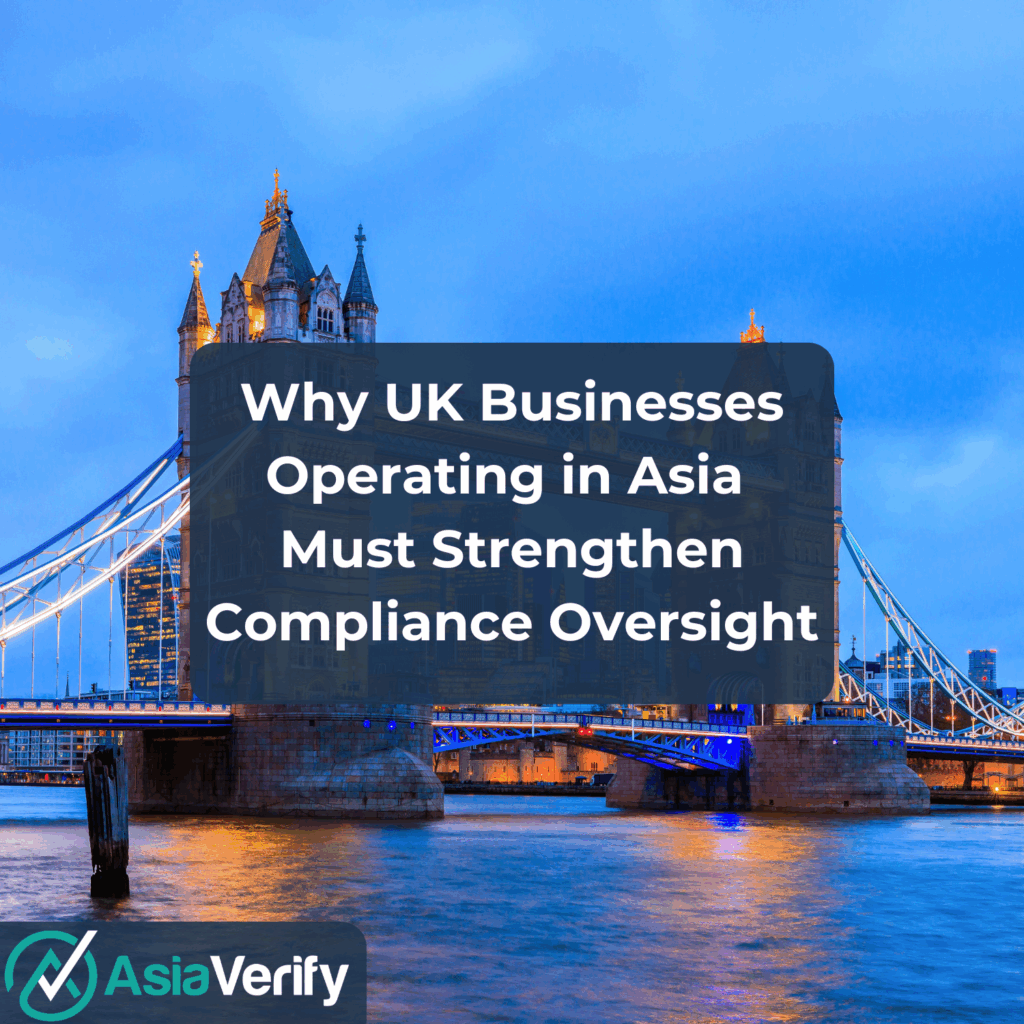UK firms need stronger oversight to manage evolving compliance risks across Asia

Regulatory expectations are evolving globally, with increased scrutiny on corporate transparency and financial crime prevention. Both the UK and Asia are tightening controls on beneficial ownership, anti-money laundering (AML), and corporate governance, requiring businesses to ensure full visibility over their operations and partnerships. For UK companies with a presence in Asia, this shift brings both challenges and responsibilities. Demonstrating due diligence, transparency, and adherence to regulations is no longer optional but essential for mitigating risk and maintaining market credibility.
Regulatory Pressures Are Increasing
Governments across Asia are reinforcing Know Your Business (KYB) and Know Your Customer (KYC) regulations, compelling firms to disclose Ultimate Beneficial Ownership (UBO) and enhance corporate reporting. Meanwhile, UK legislation such as the Economic Crime (Transparency and Enforcement) Act 2022 has intensified scrutiny on overseas entities, demanding greater clarity in financial structures and ownership.
This push for accountability reflects a global trend. Businesses must be equipped to verify, monitor, and report on corporate ownership with accuracy, ensuring compliance across jurisdictions.
The Cost of Non-Compliance
Regulatory penalties for non-compliance are increasing, alongside reputational risks and operational disruptions. A case in point is the 2019 Financial Conduct Authority (FCA) fine imposed on Standard Chartered Bank, which was penalised £102.2 million for inadequate AML controls, particularly in its overseas operations. This serves as a clear reminder that compliance obligations extend beyond home markets.
For UK firms operating in Asia, regulatory missteps can lead to enforcement actions, loss of market access, and reputational damage that undermines long-term business viability.
Key Compliance Risks in Asia
UK businesses expanding or operating in Asia face several regulatory challenges, including:
- Opaque Corporate Structures – Complex ownership networks can obscure the identities of UBOs, increasing the risk of engagement with shell companies or entities linked to financial crime.
- Divergent Regulatory Requirements – Unlike the UK’s centralised compliance framework, Asian markets vary in their AML and KYC standards. Companies must remain agile in adapting to changing regulations across different jurisdictions.
- Sanctions and AML Risks – Governments across Asia are intensifying efforts to combat financial crime. Businesses must ensure they do not inadvertently engage with sanctioned entities, politically exposed persons (PEPs), or firms with questionable financial activities.
- Operational and Reputational Impact – Compliance failures can lead to more than just regulatory fines; they can disrupt operations, erode investor confidence, and limit access to banking and financial services.
Compliance is a Business Imperative
Given the pace of regulatory change, businesses can no longer rely on periodic manual checks. Instead, they must adopt proactive strategies, including:
- Implementing automated verification and real-time risk monitoring.
- Maintaining full oversight of corporate structures and beneficial ownership across all jurisdictions.
- Staying informed about evolving regulatory requirements to prevent compliance gaps.
- Aligning internal policies with both UK and local Asian regulations to ensure seamless compliance.
With increased scrutiny from regulators, transparency and due diligence are no longer optional. They are fundamental to business continuity and credibility. For UK firms operating in Asia, compliance should be viewed as an integral part of strategic risk management rather than a regulatory burden.
Ensuring robust oversight and transparency of corporate structures, and financial transactions, is essential for mitigating risk and securing long-term success. If your business is navigating these regulatory challenges, now is the time to review compliance processes and implement stronger due diligence measures.
Have questions or need tailored advice? Our experts are here to help with compliance, data, or partnership needs.








